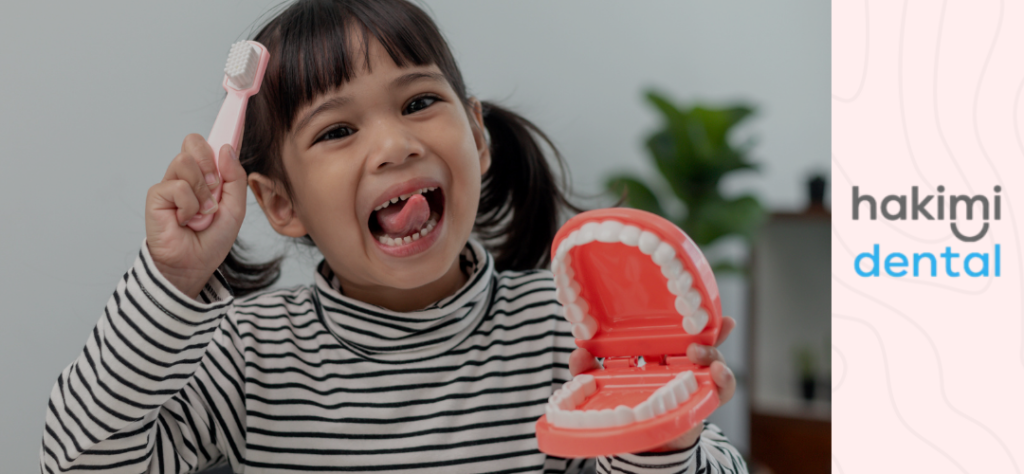Paediatric dentistry is a specialised branch of dentistry that focuses on the oral health of children from infancy through the teenage years. Proper dental care in early childhood is crucial for maintaining healthy teeth and gums throughout life.
This blog aims to provide clear and friendly information about paediatric dentistry, helping parents understand the importance of early dental care and what to expect when visiting a paediatric dentist.

What is Paediatric Dentistry?
Paediatric dentistry is dedicated to the dental care of children. This includes preventive care, early detection of dental issues, and treatment tailored to the unique needs of young patients. Paediatric dentists are specially trained to handle the dental development stages and the behavioural aspects of children during dental visits.
Importance of Paediatric Dentistry
Early dental care is essential for several reasons:
- Preventive Care: Paediatric dentists provide preventive care such as cleanings, fluoride treatments, and sealants to protect against cavities.
- Early Detection: Regular dental check-ups help detect issues early, such as tooth decay, malocclusion, or developmental anomalies, allowing for timely intervention.
- Education: Paediatric dentists educate parents and children on proper oral hygiene practices, dietary choices, and habits like thumb-sucking that can affect dental health.
- Comfort and Trust: Establishing a dental home early helps children feel more comfortable and less anxious about dental visits, promoting a lifelong habit of regular dental care.
What to Expect at a Paediatric Dental Visit
Paediatric dental visits are designed to be as stress-free and positive as possible. Here’s what you can typically expect:
- Initial Consultation: The first visit usually involves a thorough examination of your child’s mouth, teeth, and gums. The dentist will assess dental development and check for any signs of decay or other issues.
- Cleaning and Fluoride Treatment: Professional cleaning removes plaque and tartar, which can lead to cavities. Fluoride treatments strengthen the enamel, making teeth more resistant to decay.
- X-Rays: Depending on the age and dental health of your child, X-rays might be taken to get a detailed view of the teeth and jaw structure.
- Education: The dentist will discuss oral hygiene practices, such as brushing and flossing techniques, with both you and your child. They may also provide tips on healthy eating habits that promote strong teeth.
- Treatment Plan: If any dental issues are detected, the dentist will develop a treatment plan tailored to your child’s needs. This might include fillings, orthodontic referrals, or other interventions.
Tips for Promoting Good Oral Hygiene in Children
Promoting good oral hygiene from a young age is vital for preventing dental problems. Here are some tips to help you maintain your child’s oral health:
- Start Early: Begin cleaning your child’s mouth even before teeth appear by wiping the gums with a soft, damp cloth. Once teeth emerge, use a small, soft-bristled toothbrush.
- Use Fluoride Toothpaste: From the age of two, use a pea-sized amount of fluoride toothpaste to brush your child’s teeth twice a day.
- Healthy Diet: Limit sugary snacks and drinks, and encourage a balanced diet rich in fruits, vegetables, and dairy products to support healthy teeth.
- Regular Dental Visits: Schedule regular dental check-ups every six months to monitor your child’s dental health and catch any issues early.
- Lead by Example: Children mimic their parents, so make sure to model good oral hygiene habits yourself.
Common Paediatric Dental Procedures
Paediatric dentistry encompasses a variety of treatments designed to address the unique dental needs of children. Here are some common procedures:
- Dental Sealants: These are thin coatings applied to the chewing surfaces of the back teeth to prevent cavities. Sealants are particularly effective in protecting teeth from decay.
- Fluoride Treatments: Fluoride is a mineral that helps strengthen tooth enamel and prevent decay. Fluoride treatments are quick, painless, and highly effective.
- Fillings: If a cavity is detected, a filling might be necessary to restore the tooth. Paediatric dentists use tooth-coloured fillings to ensure a natural appearance.
- Crowns: In cases of extensive decay or damage, a crown might be needed to protect and restore a tooth. Stainless steel crowns are commonly used in paediatric dentistry.
- Extractions: If a tooth is severely decayed or causing crowding, it may need to be extracted. Paediatric dentists ensure this process is as comfortable as possible for the child.
Conclusion
Paediatric dentistry plays a crucial role in ensuring your child’s dental health and laying the foundation for a lifetime of healthy smiles. By starting dental visits early, promoting good oral hygiene habits, and understanding the treatments and procedures involved, you can help your child develop a positive attitude towards dental care.
Regular check-ups, preventive care, and early intervention are key components of paediatric dentistry, aiming to prevent dental issues and address them promptly if they arise. Establishing a dental home with a trusted paediatric dentist ensures that your child receives the best possible care tailored to their needs.
Remember, a healthy smile starts with good habits and early, consistent dental care. By partnering with a paediatric dentist, you can ensure your child’s teeth and gums remain healthy, setting them up for a lifetime of confident smiles.
Encourage your child to brush and floss regularly, eat a balanced diet, and attend their dental appointments. With these practices in place, you can protect your child’s oral health and foster a positive relationship with dental care that will last well into adulthood.
FAQs
It is recommended that your child has their first dental visit by their first birthday or within six months after their first tooth erupts. Early visits help establish a dental home and ensure any issues are caught early.
Children should visit the dentist every six months for regular check-ups and cleanings. Your dentist may recommend more frequent visits if there are specific concerns.
Yes, dental X-rays are safe for children. Paediatric dentists use the lowest possible radiation settings and protective measures to ensure your child’s safety during X-rays.
Start dental visits early to build familiarity and comfort. Choose a paediatric dentist who is experienced in working with children and uses a friendly, gentle approach. Reading books about dental visits and playing “dentist” at home can also help.
If your child complains of a toothache, rinse their mouth with warm water and check for any food trapped between the teeth. Apply a cold compress to reduce swelling and see your paediatric dentist as soon as possible to diagnose and treat the issue.
